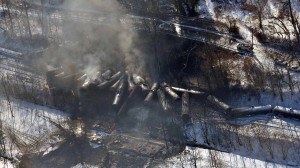Oil trains on Pa. tracks getting more scrutiny after W. Va. explosion
-
Susan Phillips

Steven Wayne Rotsch / AP/Office of the Gov. of West Virginia
An aerial photo shows a derailed train in Mount Carbon, WV., Tuesday Feb. 17, 2015. The train carrying crude oil derailed Monday night, causing a large fire that forced hundreds of people to evacuate their homes and temporarily shutting down water treatment facilities. of West Virginia
The fiery oil train derailment in West Virginia on President’s Day, which forced the evacuation of nearby residents and sent Bakken crude into the Kanawha River, has environmentalists and local lawmakers taking a more critical look at the oil trains running across Pennsylvania’s tracks.
The burning CSX rail cars in the West Virginia accident carried shale oil from North Dakota’s Bakken oil fields. Dozens of those same oil trains role across Pennsylvania each day on their way to Philadelphia area refineries. And driving, walking or biking around Philadelphia these days it’s hard to miss the rows of black cylindrical tanker cars lining the city’s railroad tracks.
Philadelphia City Council passed a resolution Thursday urging the city’s Office of Emergency Management and the Pennsylvania Emergency Management Agency to work together and make more information about the oil train routes and safety plans available to the public. Councilwoman Blondell Reynolds-Brown says the 2014 oil train derailment that had tanker cars hanging over the Schuylkill River close to the downtown area of the city was a warning.
“If there’s ever an accident it would be a bad thing so we need to be proactive and figure out what type of prevention measures they have in place to avoid an accident,” said Reynolds-Brown. “We don’t want to be in a ‘I wish I shoulda coulda place.'”
Just last month another oil train derailed in South Philadelphia. Neither of those incidents resulted in fires, spills or injuries.
The resolution also urges federal authorities to force upgrades on older model tank cars. The Department of Transportation has proposed new rules for these oil trains. But Clean Water Action’s Mary Donahue says those steps aren’t enough for cities like Philadelphia.
“Parts of that rule talk about lowering speed limits in densely populated areas, or even rerouting around densely populated areas,” said Donahue. “But in the case of Philly we are the destination for that oil so you can’t possibly reroute around us.”
Two trains made up of 120 tank cars roll into the city’s oil refineries each day. The shale oil boom in North Dakota has increased rail traffic nationwide because the country’s pipeline system does not have the capacity to transport it. Shale oil and shale gas boosters are pushing to turn Philadelphia into an “energy hub,” where more oil and gas processing and cheaper energy could attract manufacturers.
Environmental groups like Clean Water Action have asked to see the city’s emergency management plans for an oil train accident. But the city’s Office of Emergency Management director Samantha Phillips says reading those plans won’t help the public respond.
“The information is very technical, so unless the public is well versed in hazmat response it would be very difficult for the public to say, this is a good plan or this is not a good plan,” said Phillips.
Phillips says she’s confident in the city’s plan, worked out in conjunction with CSX officials and seven different government agencies. The public, she says, should respond to every disaster in the same way.
“Being informed, knowing how to shelter in place, and knowing how to evacuate are really basic and all encompassing actions that the public can take,” she said.
But Clean Water Action’s Mary Donahue says right now, the public is not informed of the risks or evacuation routes. Donahue’s group has been holding meetings about oil trains within certain neighborhoods and says it’s still an unknown danger.
Some information on the crude by rail shipments have been made available on PEMA’s website, after several newspapers filed a right-to-know request.
Pennsylvania Emergency Management Agency has gotten federal grants to do training in the case of an oil train derailment or explosion. PEMA spokesman Cory Angell says the agency has made oil train response a priority for hazmat training dollars. In fact, a recent hazmat exercise attended by some of Governor Wolf’s newly minted staff focused on the response to an oil train explosion.
















